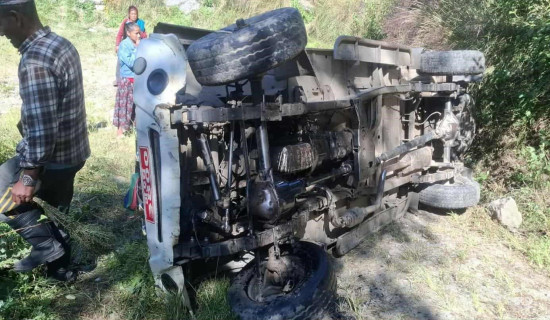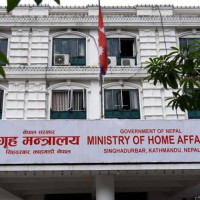- Tuesday, 21 October 2025
One Year of Government Special Supplement
Political Stability Achieved
Immediately after the formation of the current coalition government, Prime Minister Pushpa Kamal Dahal Prachanda had pledged to ensure stability, good governance, prosperity and effective service delivery to the public. It has so far been successful in establishing stability while making crusade against corruption that remains a key factor behind the nation's poor service delivery and economic backwardness. Economy was in a bad shape. A rumour is that the country is heading to the financial meltdown like Sri Lanka where the economic crisis took a nasty turn, forcing the sitting President to flee the country. But Nepal succeeded to avoid the economic trouble of that scale. The COVID-hit economy is out of the woods, but it is yet to attain full recovery.
Political stability is a prerequisite for economic development. A predictable order either in democratic polity or authoritarian system creates environment conducive for desired level of growth. However, the rapid economic development attained under the authoritarian regime is devoid of inclusive character and the distribution of wealth is skewed in favour of a handful of elites. In Nepal, a chronic instability has been a jinx on the inclusive growth and shared prosperity ever since it opened up and moved on the path of modernisation and democratisation in the middle of the last century. It is an irony that no government - elected or selected - completed its full term in office since 1951 when the country ushered in an era of democracy, freedom and civil liberties.
Structural shifts
The new constitution adopted in 2015 converted Nepal into a republican, secular and federal state, marking a structural shift in the political, administrative, economic and cultural spheres. Under the federal set-up, the three-tier of government came into existence. The federal polity is based on the principle of self-rule and shared rule whereby the people feel that the governments are at their disposal to resolve their problems ranging from livelihoods to health, education and social security. In 2017, the country first conducted the three-tier polls as per the new national charter. The government, formed following the historic elections, was saddled with the onerous task of consolidating the federal and republic system that is geared towards creating a socialism-oriented economy.
However, the then government of the Nepal Communist Party (NCP) that enjoyed a huge electoral mandate collapsed due to intense factionalism and conflict within the party. The House of Representatives was dissolved twice, frittering away a golden opportunity of democracy and a national-building mission.
The NCP broke into several factions. The House's dissolution shattered a dream of building a progressive and inclusive society, giving rise to disenchantment among people. This was one major reason behind the emergence of new political forces on the national scene.
A five-party coalition government came into existence to stabilise the chaotic politics. The alliance consisted of Nepali Congress (NC), CPN-Maoist Centre, CPN-Unified Socialist (CPN-US), Janata Samajabadi Party (JSP) and Rastriya Janamorcha. The current coalition formed in the aftermath of second general elections in 2022 is the continuity of the very pre-poll alliance. The composition of federal parliament has forced the parties to create coalition government as well as develop coalition culture. First and foremost, the present dispensation has restored the political stability necessary for maintaining policy consistency and securing the confidence of the bureaucracy and business community.
Nepali Congress general secretary Bishwo Prakash Sharma, while speaking in Kathmandu recently, said that no political crisis existed in the country. Democratic order has positive implications for overall performance of public and private sectors. As the coalition partners are firm to stay united till the next poll, the government is confidently moving to implement their common minimum programmes. PM Prachanda has said that he would remove underperforming ministers to expedite the development work as planned. This shows the PM’s commitment to development and good governance.
Another notable gain of the government is its grit to launch investigations into various corruption scandals and forgeries. Big shots, including former deputy prime minister, home minister and sitting secretary involved in the fake Bhutanese refugee scam, were sent to jail. This bold move earned appreciation from the government. Those involved in the Lalita Niwas scam in which the government’s lands were transferred into the names of private individuals were arrested. Police have nabbed individuals involved in gold smuggling that is occurring frequently.
The government and various parliamentary bodies have investigated into the sale of Ncell shares that has apparently taken place by keeping the political and business circles in dark. The government has succeeded in giving justice to the victims of loan sharks through the enactment of strict laws against the usury.
The government’s zero tolerance on corruption at all levels of state aims at promoting good governance and discouraging the immoral acts in the society. There are complaints that the anti-corruption drive is being slowed down in order to 'protect' some influential politicians and let them off the hook. The government must not drag its feet and intensify the crusade to bring them to justice.
Coalition culture
The coalition government has put up a united face against the anti-systemic forces that have come to the streets, threatening to dismantle the federal, secular and republican order. This is indeed the writing on the wall, which calls for greater reform in economy, politics and delivery of public goods such as health, education and social security.
Running a coalition government is not a cake walk. It entails foreseen and unforeseen obstacles because the government has to earn trust of not only allies but also the main opposition that is intent on throwing a spanner in its works. A vibrant coalition culture is necessary to consolidate democratic republic.
Meaningful dialogue needs to be pursued to bring the extra-constitutional forces into the democratic mainstream. The government should redouble its efforts to get vital bills related to civil service, education and transitional justice approved from the House. Maintaining judicial impartiality and transparency is equally important so as to uphold the principle of justice. The government must assess one year’s performance to perform better in another year.
(The author is Deputy Executive Editor of this daily.)
















